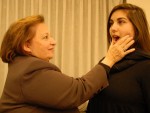Title
The Pre-College Division’s operatic voice program, led by Lorraine Nubar, offers a comprehensive music curriculum on a day when most high school students are enjoying time off. The program maintains a small roster of 12 to 15 students who share the commitment to pursue excellence, work hard, and spend their Saturdays at Juilliard.
Body
Nubar and her team—faculty members Jorge Parodi, Cynthia Sanner, Sooyeon Kim and pianist Matthew Odell, a doctoral candidate—begin the process in May with the entrance audition. Applicants range from those with little formal musical training, but extensive experience singing in church or school musicals, to those with little exposure to opera at all. “We look for the potential,” Nubar explains. “Some kids have a wonderful natural instrument, clear musical instincts, personality and expressivity, even if they have never heard any of the great singers. At the center of it all is this mysterious thing called ‘talent.’”
The program is kept small so that highly personalized attention can be given to each student. “We start with a careful assessment of each young singer’s gifts and aptitudes,” explains vocal coach Jorge Parodi, “and constantly adjust the pace of our work and the degree of the challenges we present to them.” Nubar sees her job as discovering who each student is musically, and guiding them step-by-step to their goals. “We can find the talented ones, but they cannot rely alone on a strong voice,” she says. “Singers need to consider so many things: the muscular coordination of the voice, the physicality, expressivity, and uniqueness of their singing. They must be actors and linguists. They must respect poetry and history and the great singers of the past.”
All of this can be a tall order, especially when students enter the program as high-school juniors or seniors. “We must work fast—but not too fast,” she says, adding that every student grows at his or her own pace. The minimum age for acceptance is 14, but students are typically 15 or 16 when they enter the program. This leaves little time to prepare them for their senior recitals (presented as part of their graduation requirement), college auditions, and the Pre-College program’s Opera Scenes production, staged annually in late April.
The training that Pre-College voice students receive is similar to vocal training at the collegiate or professional level, but Nubar pays special attention to building awareness in her young class. “Students need to become aware of their own instrument, which is the first step to creating their own musical fingerprint,” Nubar explains. The process is a delicate and highly personal one, and is critical in helping students find the beauty and color in classical singing.
Nubar breaks down the Pre-College vocal training into three parts, the first being one-on-one instruction. “The gift of time is not as available as it once was,” she says, comparing the one-hour weekly lesson with the days when daily lessons and supervised practicing were the norm. Today’s Pre-College students tend to be high achievers in many aspects of their lives, balancing their individual practice with high-school honors and advanced placement classes and extracurricular activities.
Group training is the second crucial part of the program. The 90-minute Vocal Performance class gives students the opportunity to sing for their peers and the faculty, who all offer critiques and constructive criticism. Sometimes the students are asked to play games designed to help release their imaginations and find their natural impulses and primitive responses to sound and movement. The performance class encourages students to support each other, and helps to cultivate a strong bond among the class.
The final part of training is performance—“the end point of it all,” says Nubar, “standing in front of an audience and communicating a message.” She stresses the importance of proper preparation, like researching the composer and his work, and understanding its context and historical relevance. “Because of the required graduation recital, I learned how singers prepare a one-hour solo performance, including how to select repertoire,” says soprano and Pre-College alum Kathleen Kim, who made her Metropolitan Opera debut in 2007 and recently completed a run as Papagena in Mozart’s The Magic Flute at the Met, and will sing the roll of the Doll in The Tales of Hoffmann there next season. “Most high school students do not have this kind of opportunity so early in their training.”
Nubar also insists that the students translate all songs into English as part of the process. “It is a task that young singers do not do enough,” she points out. “Many young American singers do not have backgrounds in languages other than English.” In response to this issue, the Pre-College engaged some of the College Division’s top diction coaches: Marianne Barrett (German), Corradina Caporello (Italian), Thomas Grubb (French), and Kathryn LaBouff (English).
LaBouff has a unique perspective on the program, as both a diction coach on the faculty and mother of a current student. “After two years of this in-depth training, my daughter has grown and developed vocally, musically, and artistically in a way that would have not been possible otherwise. It is a wonderful feeling to give them a good head start, with a language and diction approach that will serve them well in their future vocal training.”
Nubar admits that, although the program has come a long way, it will continue to evolve—as will her teaching. “When dealing with high-school singers,” she explains, “your goal is to provide them with the building blocks of singing and musicianship that they will work to perfect for the rest of their lives.”





